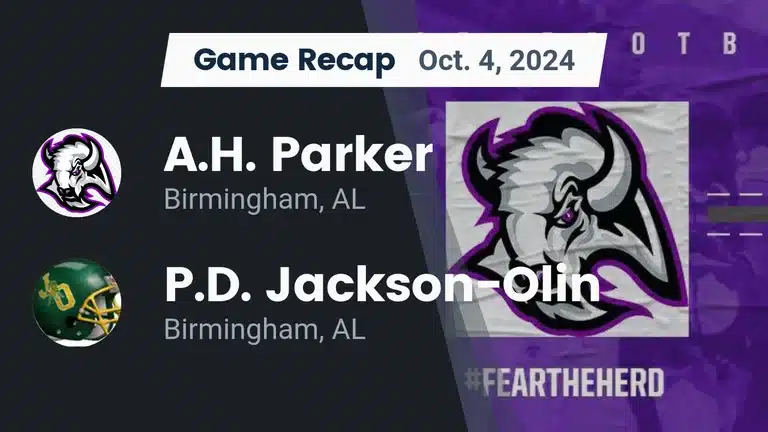High school football coaches play a vital role in shaping young athletes. They are responsible for training, mentoring, and leading their teams.
But how much do they earn for their efforts? Understanding the salary of a high school football coach can be complex. Various factors, such as location, school size, and experience, influence their earnings. Some coaches work full-time, while others do it part-time, affecting their pay scale.
In this blog, we will dive into the factors that determine a high school football coach’s salary. We will explore average earnings, regional differences, and what you can expect if you pursue this career path. Whether you’re considering coaching or just curious, this guide will provide valuable insights.

Credit: bulldawgillustrated.com
Introduction To High School Football Coaching Salaries
High school football coaching is a rewarding yet demanding career. Many people wonder about the salaries of these dedicated professionals. This section delves into the nuances of high school football coaching salaries.
Brief Overview
High school football coaches play a vital role in shaping young athletes. Their responsibilities range from training to mentoring students. The salary varies based on location, experience, and school size. On average, high school football coaches earn between $25,000 and $75,000 annually. Some coaches in affluent areas or large schools may earn more.
Importance Of Salary Insights
Understanding salary insights helps aspiring coaches set realistic expectations. It also aids schools in offering competitive packages to attract talented coaches. Salary transparency can lead to better job satisfaction and career longevity. Knowledge of salary standards is essential for negotiations and career planning.
Factors Influencing Salaries
High school football coach salaries vary widely. Several factors influence these earnings. Understanding these factors can help coaches maximize their pay.
Experience Level
Experience plays a key role in determining a coach’s salary. Coaches with more years on the field generally earn higher pay. A veteran coach brings valuable skills and insights to the team. Their experience often translates to better team performance. This can lead to higher salaries.
Education And Certifications
Education and certifications also impact salaries. Coaches with advanced degrees or special certifications may earn more. A degree in sports management or physical education can be beneficial. Certifications from recognized bodies add to a coach’s credibility. These qualifications show a commitment to the profession and often lead to higher earnings.
Here’s a quick look at how these factors impact salaries:
| Factor | Impact on Salary |
|---|---|
| Experience Level | Higher experience typically means higher pay. |
| Education | Advanced degrees can increase salary potential. |
| Certifications | Specialized certifications often lead to better pay. |
Understanding these factors can help coaches plan their career path. By focusing on gaining experience and earning relevant degrees and certifications, they can improve their earning potential. It is essential for coaches to continuously learn and grow in their field. This dedication will reflect in their salaries.
Geographic Variations
The salary of a high school football coach can vary widely based on geographic location. Factors like state policies, school district budgets, and local demand can influence pay scales. Understanding these variations helps aspiring coaches make informed career choices.
State Differences
States have different approaches to compensating high school football coaches. For example, Texas and California often pay more due to larger budgets and higher demand for sports programs.
- Texas: Coaches can earn between $50,000 to $100,000 per year.
- California: Salaries range from $40,000 to $90,000 annually.
- Florida: Typical earnings are between $35,000 and $75,000 per year.
- Ohio: Coaches might make $30,000 to $65,000 annually.
These figures illustrate the significant state-level differences. Coaches in states with strong sports cultures often have higher earning potential.
Urban Vs. Rural Areas
The location within a state also affects a coach’s salary. Urban areas usually offer higher pay compared to rural locations. This is due to larger school districts and more funding.
| Area Type | Average Salary |
|---|---|
| Urban | $50,000 – $100,000 |
| Suburban | $40,000 – $80,000 |
| Rural | $30,000 – $60,000 |
Urban areas offer higher salaries due to larger student populations and more resources. Rural areas might have lower pay but offer a different set of rewards, such as closer community ties.
Understanding these geographic variations is crucial for anyone considering a career as a high school football coach. It helps in setting realistic expectations and making informed decisions.

Credit: www.reddit.com
School Size And Budget Impact
Understanding how much a high school football coach makes often depends on several factors. One significant factor is the size of the school and its budget. Let’s dive into how these elements influence a coach’s salary.
Large Vs. Small Schools
Coaches at large schools usually earn more. These schools have bigger budgets. They can afford to pay higher salaries. Larger schools often have more students. This means more ticket sales and booster support. With more money available, coaches benefit.
Small schools operate differently. They have fewer students and less revenue. Coaches here usually make less. The budget for sports is smaller. The focus might be on academics. Small schools may not prioritize sports funding. This affects the coach’s pay.
Public Vs. Private Schools
Public schools rely on government funding. This often limits their budget for sports. Public school coaches might earn less. Their salaries depend on state and local budgets. Sometimes, they receive extra pay for other duties.
Private schools have different funding sources. They rely on tuition and donations. This can lead to higher budgets for sports. Coaches at private schools might earn more. The school may attract wealthy donors. This financial support boosts salaries.
Additional Income Opportunities
High school football coaches often seek additional income opportunities beyond their regular salaries. These opportunities provide financial benefits and enrich their coaching careers. Let’s explore two popular avenues for supplemental income: summer camps and private training.
Summer Camps
Many high school football coaches run summer camps for young athletes. These camps are a great way to earn extra money during the off-season. Coaches can charge fees for participation, offering skills training and practice sessions. These camps help young players improve their football skills and knowledge.
Organizing these camps can also boost a coach’s reputation in the community. Parents appreciate the extra effort to develop their children’s athletic abilities. This can lead to more opportunities and increased demand for the coach’s expertise.
Private Training
Private training sessions offer another income stream for high school football coaches. These one-on-one or small group sessions provide personalized coaching. Coaches can charge a premium rate for their time and expertise.
Private training helps players focus on specific areas needing improvement. This targeted approach leads to better performance on the field. Coaches who excel in private training can build a loyal client base. Word of mouth can help attract more players seeking specialized instruction.
By diversifying income sources through summer camps and private training, high school football coaches can enhance their financial stability. These opportunities also allow coaches to make a more significant impact on their players’ development.
.jpeg)
Credit: www.star-telegram.com
Benefits And Perks
Being a high school football coach is not just about the love of the game. Many coaches receive various benefits and perks that make their job more attractive. These extras can add significant value to their overall compensation package.
Health Insurance
Most high school football coaches receive health insurance as part of their employment package. This usually includes:
- Medical coverage
- Dental coverage
- Vision coverage
Health insurance helps cover the costs of medical care. This is important because it ensures that coaches and their families have access to necessary healthcare services.
Retirement Plans
Many high school football coaches also benefit from retirement plans. These plans help them save for the future. Common retirement plans include:
- 401(k) plans
- 403(b) plans
- Pension plans
These plans often come with employer contributions. This means that the school district adds money to the coach’s retirement savings. Over time, these contributions can grow significantly.
Challenges And Job Stability
Being a high school football coach can be both rewarding and challenging. While some might see the role as glamorous, it comes with its unique set of hurdles. Understanding the challenges and job stability of this profession is crucial for anyone considering this career path.
Job Security
One of the primary concerns for high school football coaches is job security. School budgets are tight. Sports programs are often the first to face cuts. Coaches must constantly prove their value to the school and the community. Success on the field is important, but so is building strong relationships with students and parents. Consistent performance and a positive impact on students’ lives can improve job security.
Work-life Balance
Balancing work and personal life is another significant challenge for high school football coaches. The role demands long hours, including early mornings, late evenings, and weekends. During the football season, practices, games, and travel can dominate a coach’s schedule. This can make it difficult to spend time with family and friends.
| Work Activities | Hours per Week |
|---|---|
| Practice Sessions | 15-20 |
| Games | 10-15 |
| Travel | 5-10 |
| Administrative Tasks | 5-10 |
Coaches need to find ways to manage their time efficiently. It is essential to set boundaries to ensure that personal time is not completely overshadowed by professional responsibilities. Many coaches rely on strong organizational skills and support from their families to maintain a healthy balance.
Future Trends In Coaching Salaries
Future trends in coaching salaries are a hot topic. High school football coaching is evolving. Salaries are changing too. Coaches want to know what the future holds. Will their paychecks grow? How does sports popularity impact their earnings? Let’s explore these questions.
Projected Salary Growth
Experts believe coaching salaries will increase. More schools are investing in sports programs. Bigger budgets mean more money for coaches. This trend is good news for high school football coaches. They can expect better pay in the future.
Economic factors also play a role. As the economy grows, so do salaries. Inflation impacts all jobs, including coaching. Schools must pay more to keep good coaches. This is a positive trend for those in the profession.
Impact Of Sports Popularity
Sports popularity affects coaching salaries. High school football is very popular in many areas. More fans mean more money. Schools earn more from ticket sales and sponsorships. This extra income can increase coaching salaries.
Media coverage also boosts popularity. Games on TV attract more viewers. More exposure brings more revenue. Coaches benefit from this trend. Higher viewership can lead to higher pay.
Community support is another factor. When a team wins, the community celebrates. Local businesses may sponsor the team. These sponsorships can increase funds for the sports program. Coaches then see a rise in their salaries.
Frequently Asked Questions
How Much Do High School Football Coaches Earn?
High school football coaches’ salaries vary greatly. They typically earn between $25,000 and $75,000 annually. Factors like location and experience influence pay.
What Factors Affect A High School Football Coach’s Salary?
Several factors affect a coach’s salary. These include the school’s budget, location, team’s success, and the coach’s experience.
Do High School Football Coaches Earn Bonuses?
Yes, high school football coaches often earn bonuses. These bonuses may depend on team performance and playoff appearances.
Are High School Football Coaching Positions Full-time?
Not always. Many high school football coaches work part-time. They may also hold teaching or administrative positions at the school.
Conclusion
High school football coaches’ salaries vary widely. Location and experience play key roles. Urban areas often pay more than rural areas. Experienced coaches typically earn higher salaries. Benefits and bonuses may also affect earnings. Interested in coaching? Research your local schools’ salary ranges.
Passion for the sport is essential. Coaching can be rewarding both financially and personally. Consider these factors before pursuing a coaching career.





